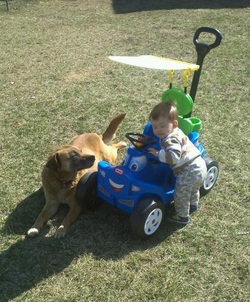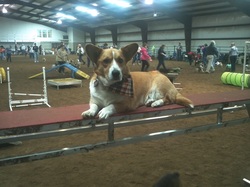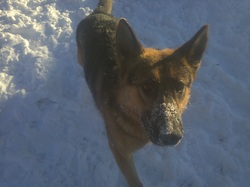As I begin a new set of classes called "Reactive Rover" to help clients with hyper sensitive dogs (something I have been doing in private lessons for some time), I find myself explaining to owners that this is a personality type that requires not only training and desensitization, but maintenance as well. This is not a virus that can be cured with a round of antibiotics, but rather a personality type that needs regular "medication" to maintain balance and lessen anxiety. I am often greeted with disappointed frowns when I drop this bombshell. Don't we all wish we could change our dog's personality! But alas, they are who they are and while we can get them to grow and improve in the areas they are deficient, those old habits can come back easily (and rather quickly) because they fall more into line with their natural personality.

I come from two parents who would not consider themselves as extremely outgoing. While they do quite a bit of public speaking as they travel across the country instructing others on how to move livestock with their dogs, they would probably both agree that they are not the type of person to sign up for an Intro to Public Speaking Class in college "for fun". I undoubtedly inherited these traits, my mom likes to tell stories of my painful shyness as a child. So how did I become the type of person who would take Public Speaking as an elective (yes, I did that!)? Practice, desensitization, and practice! I started by giving a speech in high school at a Future Farmers of America speech contest after much prodding from my Agriculture teacher at the time. I then became an officer in just about every high school extra curricular I could (FFA, FCCLA, Yearbook, Student Council, FCA, etc.), and competed in just about every contest the FFA had to offer. While this ultimately led to a college degree in communications, I still struggle with my shyness when I haven't spoken in front of a group of people in awhile. Thankfully since I teach group classes, I constantly have the "maintenance" I need to keep my bashfulness at bay. So what does this have to do with your dog? If you have a dog who is reactive, they will always have those tendencies within them. In order to improve their behavior, it will take a certain period of time addressing the behaviors, then a lifetime of maintaining it. So what does "maintenance" look like?
It just so happens that I have 3 maintenance dogs myself, here are their stories:

"Cena"- Cena is more than likely some sort of Labrador mix. It is anyone's guess considering I found her dumped on the side of a country road when she was bout 4 months old. Since the day I brought her home, she treated food as a luxury, inhaling whatever I put in front of her ( I would too if I was left out in the country to fend for myself when I was barely old enough to be weaned from my mother!). I quickly found that she had extreme dog aggression, especially when food was involved. She has never shown an inkling of aggression toward people but has been in some pretty serious dog fights.
We have spent many hours working on obedience, leadership, thinking instead of reacting, and self control. She is now 6 years old and is one of the best dogs I have ever had but she will always be in a state of "maintenance". When a dog makes her uncomfortable, she comes directly to me and asks me to intervene. However, she still does not get to meet any dogs that come to my facility for training or boarding (don’t worry, she prefers it that way!). She can now be around my other dogs when food is present, however I make sure I feed all my dogs separately. Finally, I do not fear running into other dogs when taking Cena for a walk, however, she will never be one of my Demo and Event Dogs (once again, she doesn't mind this decision!). I also know that if I have not spent an adequate amount of quality time with her, her behavior will reflect that.
We have spent many hours working on obedience, leadership, thinking instead of reacting, and self control. She is now 6 years old and is one of the best dogs I have ever had but she will always be in a state of "maintenance". When a dog makes her uncomfortable, she comes directly to me and asks me to intervene. However, she still does not get to meet any dogs that come to my facility for training or boarding (don’t worry, she prefers it that way!). She can now be around my other dogs when food is present, however I make sure I feed all my dogs separately. Finally, I do not fear running into other dogs when taking Cena for a walk, however, she will never be one of my Demo and Event Dogs (once again, she doesn't mind this decision!). I also know that if I have not spent an adequate amount of quality time with her, her behavior will reflect that.

"Tru"- This is my Cardigan Welsh Corgi and unlike my other two dogs, I actually got her as a puppy and know her complete history but don't think this makes her devoid of her own issues! You see, Corgis original purpose was to herd cattle. As you can see Tru is what you might call vertically challenged, so how on earth can she get huge cattle to move? Well among other things, her voice! They bark to intimidate the livestock, which in turn creates a breed that as a whole tends to be quite, shall we say, VOCAL. From day one, Tru liked to talk about EVERYTHING. She barks, whines, growls, yodels, and a few things in between. While her behavior has never been what I would call aggressive, she is a higher anxiety, reactive dog. Tru feels especially vulnerable when greeting other dogs on leash. There was a time in her younger years that she would growl or even snap at other dogs when they made her uncomfortable.
Through lots of desensitization, self control exercises, and leadership activities Tru has learned one of my Golden Rules "If you cannot say anything nice, don't say anything at all". Tru now participates in most of my on leash greeting exercises in my puppy group classes. She does wonderfully at her "job" because she trusts me implicitly with her safety, knowing I will not put her in a situation that is not safe. She has also learned that when she does feel uncomfortable, that is it okay to say politely that she does not want to greet a dog (by passing by them and ignoring them) and I respect that decision. She will always be a very excitable dog who needs continued work on self control. (Especially when she has been "off work" for awhile, like when she attends January classes after a long Christmas break!) but she definitely gets compliments everywhere she goes, especially from people who know how stubborn Corgis can be!
Through lots of desensitization, self control exercises, and leadership activities Tru has learned one of my Golden Rules "If you cannot say anything nice, don't say anything at all". Tru now participates in most of my on leash greeting exercises in my puppy group classes. She does wonderfully at her "job" because she trusts me implicitly with her safety, knowing I will not put her in a situation that is not safe. She has also learned that when she does feel uncomfortable, that is it okay to say politely that she does not want to greet a dog (by passing by them and ignoring them) and I respect that decision. She will always be a very excitable dog who needs continued work on self control. (Especially when she has been "off work" for awhile, like when she attends January classes after a long Christmas break!) but she definitely gets compliments everywhere she goes, especially from people who know how stubborn Corgis can be!

"Ziva"-As many of you know, I adopted Ziva almost a year ago (my, does time fly!) from Saving Death Row Dogs. She was found as a stray and no one came forward to claim her. When I took ownership of Ziva she had crate anxiety, separation anxiety, jumped fences, tried to bust out of crates, and growled at other dogs when they approached, just to name a few! We spent several weeks building her confidence and getting her comfortable with being alone and confined. We also practiced desensitization, self-control, patience, attention span, leadership exercises, and learning how to accept affection (it broke my heart that she didn't know how to process affection!). As she began to look to me for leadership and trusted me with her well-being, she began to gain confidence and developed quite an appetite for learning!
Nowadays my husband and I look at each other and shake our heads, wondering why anyone would not want the dog we have today but we definitely remember how much work it took (and still takes) to manage her personality. She will always have tendencies toward higher anxiety. She will probably always need some supervision if she is in the yard during gunfire, fireworks, or thunder as she may have a relapse and jump the fence. She tends to get "wired" if I have had an extra dog boarding and she isn't getting the attention she is used to from me. She usually needs some extra training sessions if she has been getting a smaller piece of the pie of quality time. Despite her initial anxiety about greeting other dogs, she is now one of the best dogs I have for dog to dog greetings on leash and off. She still has her moments of fragility but turns to me for encouragement and help in those situations instead of lashing out at the other dog.
Nowadays my husband and I look at each other and shake our heads, wondering why anyone would not want the dog we have today but we definitely remember how much work it took (and still takes) to manage her personality. She will always have tendencies toward higher anxiety. She will probably always need some supervision if she is in the yard during gunfire, fireworks, or thunder as she may have a relapse and jump the fence. She tends to get "wired" if I have had an extra dog boarding and she isn't getting the attention she is used to from me. She usually needs some extra training sessions if she has been getting a smaller piece of the pie of quality time. Despite her initial anxiety about greeting other dogs, she is now one of the best dogs I have for dog to dog greetings on leash and off. She still has her moments of fragility but turns to me for encouragement and help in those situations instead of lashing out at the other dog.
I hope in telling you about my own "maintenance dogs" it will help you understand what I mean when I say your dog cannot simply be "fixed" it needs to be maintained. I also hope it makes owners aware of the fact that our dogs will never be "perfect". As a matter of fact, when an owner says to me, "Well they aren't perfect yet, but…". I usually reply with, "Well good, because neither am I, and I wouldn't want them showing me up!". We cannot change their personalities but we can help them face their fears and grow into better companions as well as lower their anxiety levels. And finally, just as we have to continue to exercise to stay in shape, we need to continue training sessions, not just when we want to teach our dog something new, but also to keep the skills we have already taught them sharp.











 RSS Feed
RSS Feed